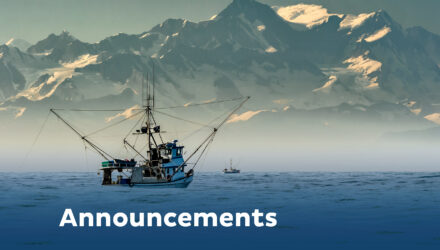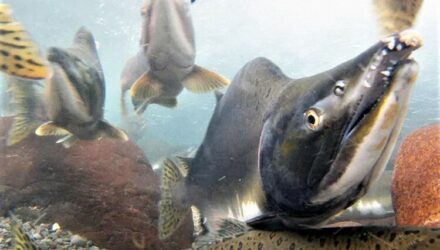Extraordinary Circumstances

Extraordinary Circumstances
Submitted to Northern Lights in National Fisherman Magazine, October 2023
The Alaska seafood industry is facing extraordinary market challenges. A convergence of domestic and international circumstances have created hardship for everyone in our industry. The ASMI Board of Directors recognizes that these market downturns acutely affect Alaska fishermen; the men and women who mold their lives around our fishing seasons to support their families. We empathize with the economic pain many fishermen are experiencing.
Although Alaska’s fishermen produce more than 60% of America’s wild-caught seafood, Alaska seafood competes in a global market; by value, 2/3 of Alaska’s catch is exported. By weight, 80% is exported. We’re the 15th largest global seafood exporter (by value) and we harvest less than 10% of global salmon supply. In short, Alaska seafood is a significant part of the domestic and international seafood markets, but we are subject to numerous geopolitical, trade inequity, and economic factors beyond our control.
It’s not “just salmon”, “just Alaska pollock” or “just sablefish” that are experiencing these market pressures. Many Alaska species are currently experiencing a large supply and demand imbalance. While Alaska experienced a large 2023 pink salmon harvest of almost 200,000 metric tons, it’s important to note that Russia likely harvested over three times what we brought in. The sheer size of the Russian harvest and the significantly lower value of the Russian ruble has allowed Russia to sell pink salmon and salmon roe to our shared customers at very low prices, driving down market value for all salmon species.
Also, the ongoing trade war with China has led to a 50% drop in U.S. seafood exports to China, falling from nearly $1 billion in 2017 to roughly $500 million this year. While ASMI is working hard to diversify away from China, and we are seeing progress, the loss of the Chinese commodity market has led to a lack of revenue for processors during a time of high interest rates and large inventories. China’s reprocessing sector is also providing a vehicle for Russian origin seafood to enter U.S. and European markets by obscuring the country of origin. Consequently, less-expensive Russian origin seafood continues to compete head-to-head with Alaska seafood in virtually all markets.
The strong U.S. dollar directly increases the sale cost of Alaska seafood in traditional markets like Japan and Europe. Moreover, inflation has increased labor, materials, shipping and cold storage costs while fuel costs have doubled over the past 18 months. Additionally, interest rates have gone up five percentage points since March 2022, harming processors’ ability to secure financing while they hold product in inventory awaiting better pricing, further hurting cash flow.
On the demand side, consumers are feeling the effects of inflation and the high cost of food. Dollars don’t go as far as they used to, especially at the grocery store. People are still going out to eat but spend less on Alaska seafood products when food budgets are tight. Retail prices for Alaska seafood remain high as retailers seek to improve margins and profitability, even as wholesale prices are dropping. Reduced consumer demand has made retailers cautious when buying seafood. In summary everyone throughout the Alaska seafood supply chain is hurting.
In the midst of this crisis, ASMI has taken immediate action. We moved an additional $1,000,000 to domestic marketing and continued the salmon marketing campaign throughout the summer – a time when, traditionally, little promotion is needed. ASMI increased efforts to secure U.S. Government purchases of Alaska seafood by facilitating sales of more Alaska products into more federal programs. In the first six months of this year, the government purchased $120 million worth of Alaska seafood, more than twice the amount sold last year.
ASMI has focused our international marketing efforts on Alaska products most in need. We opened an office in Southeast Asia as well as expanded our presence in Latin America. New international markets take time, but ASMI is building a more diverse and resilient international market future. Also, the State of Alaska supported ASMI and Alaska’s fishing industry this year with a $5,000,000 appropriation. These funds will help ASMI continue its critical work to keep telling the Alaska seafood story in the U.S. and around the globe.
Industry experts note current market conditions place our industry in an economic squeeze not seen for decades or longer. Many Alaska processors struggle to pay fishermen on time or have quit buying all together. Alaska fishermen don’t know how they will make boat payments. While “we’re all in this together” isn’t a consolation, it’s a starting place to realize these global economic factors cause significant challenges and hardship for all of us in the Alaska seafood industry. Recognizing a common need for improvement should bring our industry together to forge a stronger future through strategic actions to increase market demand for Alaska seafood and build better wholesale and ex-vessel value.
While ASMI is a key player in helping our industry through these challenging times, all of us have a role to play. We can create opportunities from this crisis and take action to ensure the future vitality of our industry. We can gain access to new markets and innovate with new and improved products. We should all advocate to close the loophole allowing Russian seafood to enter the U.S. market and ensure fishermen are treated equally under federal agriculture programs. We all must continue to ensure the highest quality of our seafood throughout the supply chain so that when consumers try it, they come back for more. These are incredibly challenging times, but we know there is reason to believe in the future of Alaska seafood.
Signed by The Alaska Seafood Marketing Institute Board of Directors
Allen Kimball, Chair
Tomi Marsh, Vice-Chair
Michael Erickson
Duncan Fields
Mark Palmer
Richard Riggs
Jack Schultheis


